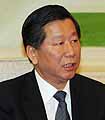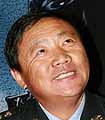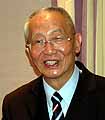|
Regulator's Magic Needed

After steep declines in China's stocks, Shang Fulin, Chairman of the China Securities Regulatory Commission (CSRC), has started a new round of campaigning to stabilize investor confidence.
According to Xinhua News Agency, Shang outlined several market boosting measures at a CSRC meeting on June 22, including the need to rationally balance the supply and demand in the capital market and regulate the pace of fund-raising. He also pledged to severely punish people who spread rumors that disrupt market order and increase volatility.
By June 20, China's benchmark Shanghai Composite Index had fallen 54 percent from its all-time high in mid-October 2007. In the first 13 trading days of June alone, the index dropped 19.94 percent. Retail investors and some economists have pinned their hopes on Shang, one of the major forces behind the last bull run of China's stock market from 2005 to 2007, to revive the market through proactive policies as soon as possible.
Shang, 57, who assumed CSRC chairmanship at the end of 2002, launched the long-awaited split share reform in mid-2005, which was meant to make state shares eligible for floating through paying certain compensation shares or cash to public shareholders. The extensive restructuring was followed by a two-year market boom.
However, China's stock market began to plunge in November 2007 over fears that the government's tightening measures would erode corporate profits and the equities supply would overwhelm demand. A recent survey found that nearly 90 percent of stock investors had suffered losses by June 17.
Shang is facing his biggest test to date.
Bomb Hero Immortalized

Yu Shangqing, a police officer who was severely injured in a bomb disposal mission five years ago, returned to the public spotlight after a film depicting his heroic deeds was awarded Grand Jury Prix at this year's Shanghai International Film Festival on June 14-22.
Yu, 52, who was inexperienced in defusing time bombs, removed a total of 11 explosives planted by two sacked employees in a local hotel in northeast China's Qiqihar City on September 1-2, 2003, because professional bomb disposal personnel were not available at the time. The last device exploded when Yu was attempting to defuse it. Yu's left eye, right ear and right leg were disabled in the incident and more than 100 pieces of the bomb are still deeply embedded in his body and unable to be removed.
"I felt responsible for people who could have gotten hurt by the explosives," Yu told the media, after Old Fish, the award-winning film adapted from his story, was screened. "If I gave up, more people would be left in danger."
World Volleyball Chief

Wei Jizhong, a veteran Chinese sports official, has been elected the third president of the Federation Internationale de Volleyball (FIVB or International Volleyball Federation) at the 31st FIVB World Congress in Dubai, United Arab Emirates, on June 17. He is to replace Rubén Acosta, who has served as FIVB president for 24 years, after the Beijing Olympic Games in August.
Wei, 71, has worked for FIVB for 26 years and is currently first executive vice president of FIVB and president of the Asian Volleyball Confederation.
"I'm sure Mr. Wei will bring fresh ideas to our sport. It is not just a matter of age, it is a matter of competence. He will bring new ways, a new image," said President Acosta at a press conference after the FIVB Congress.
Wei is the 12th Chinese to head an international sports organization. His term expires in 2012.
"We need to listen to people's voices extensively and pool the people's wisdom when we take actions and make decisions. The Web is an important channel for us to understand the concerns of the public and assemble the wisdom of the public."
Chinese President Hu Jintao, when visiting people.com.cn, a leading news portal, on June 20
"A hundred years ago, the Western world already predicted that if every Chinese wore one more item of clothing and lit up one more oil lamp, that would form a huge market. Unfortunately, when China's purchasing demand was realized through development, everyone felt there was something wrong."
Chinese Vice Premier Wang Qishan, blaming trade protectionism in a speech delivered at a banquet in honor of him that was jointly hosted by personages from New York business circles on June 19
"Most strikingly, the Dalai Lama is used as a battering ram by Western governments in their culture war with China. The reason he is flattered by world leaders and bankrolled by the CIA is not because these institutions care very much for liberty in Tibet, but rather because they want to ratchet up international pressure on their new competitors in world politics: the Chinese."
Brendan O'Neill, London-based journalist and editor of Spiked Online, in an article entitled "Down With the Dalai Lama" that was published by The Guardian newspaper on June 18
"OPEC has already done what OPEC can do and prices will not come down."
President Chakib Khelil of the Organization of the Petroleum Exporting Countries (OPEC), talking to reporters as he arrived for a high-level dialogue with EU officials in Brussels on June 24, as world oil prices reach $140 per barrel, a once unimaginable record level | 